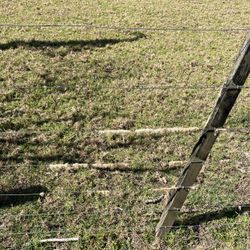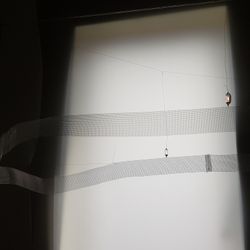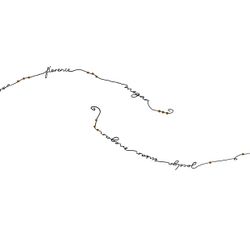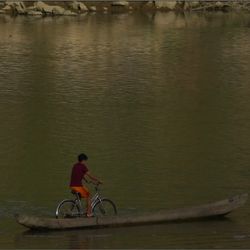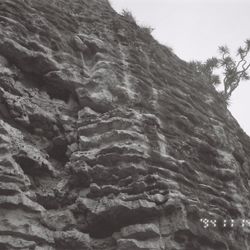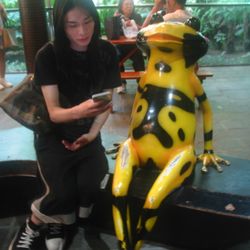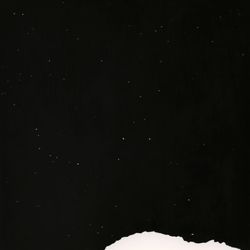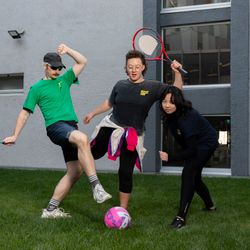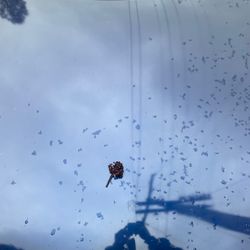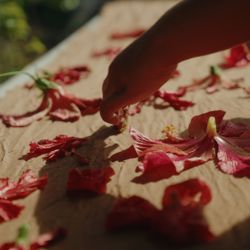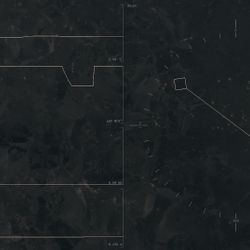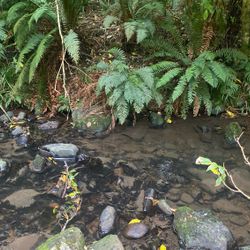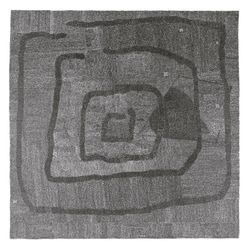Māori Girl is a new solo exhibition by recently relocated Ōtepoti-based artist, Ayesha Green, and looks to a wider understanding of relationships in our contemporary context, asking specifically, what does whanaungatanga mean in a bicultural nation? This exhibition includes paintings and sculptural installations, referencing the interrelation and unity of friendship, whakapapa and place.
Past Exhibition
Wenerei 28 Noema -
Hātarei 22 Tīhema
Wednesday 28 November -
Saturday 22 December
2018
Image: Ayesha Green, 'For Morrie', gold snake chain, various Pounamu on loan from Oatgo Museum, fabric and hardboard, 2018.
Māori Girl, a whaling boat built in 1871 for Tame Parata and Parahu Tira for their Waikouaiti Whale Fishery Company, was donated to Toitū Otago Settlers Museum in 1932. As a vessel we can draw metaphors about its personification—conduits of blood and immaterial traits of self. With the ability to float and hold others above water, Māori Girl acts as the stage between the ocean and the sky.
Māori Girl is generously supported by Chartwell Trust. We would like to warmly thank Ōtākou Runaka, The Otago Museum, Dunedin City Public Libraries, Māia Abraham, Cushla Donaldson and Anna van Hattum for their support in the production and development of this exhibition. We would also like to acknowledge and thank The Physics Room and Jan Warburton Charitable Trust for their support in the development of Kurawaka , included in this exhibition.
Image: Ayesha Green, Māori Girl, installation view, 2018.
Image: Ayesha Green, 'For Morrie', gold snake chain, various Pounamu on loan from Otago Museum, fabric and hardboard, 2018.
Image: Ayesha Green, 'For Morrie', gold snake chain, various Pounamu on loan from Otago Museum, fabric and hardboard, 2018.
Image: Ayesha Green, 'Cyathea dealbata', oil on canvas, 2018.
Image: Ayesha Green, 'Cyathea dealbata', oil on canvas, 2018.
Image: Ayesha Green, Māori Girl, installation view, 2018.
Image: Ayesha Green, 'Mosaic', ceramic tiles on board, 2018.
Image: Ayesha Green, 'Mosaic', ceramic tiles on board, 2018.
Image: Ayesha Green, 'Mosaic', ceramic tiles on board, 2018.
Image: Ayesha Green, 'Kurawaka', acrylic on board and wall, 2018.
Image: Ayesha Green, 'Tamatea Road', acrylic on three porcelain milk jugs, coat rack, 2018.
Image: Ayesha Green, 'Tamatea Road', acrylic on three porcelain milk jugs, coat rack, 2018.
Image: Ayesha Green, 'Puku', acrylic on board, 2018.
Image: Ayesha Green, 'Puku', acrylic on board, 2018.
Image: Ayesha Green, 'Puku', acrylic on board, 2018.
Image: Ayesha Green, Māori Girl, installation view, 2018.
Image: Ayesha Green, 'For Morrie', gold snake chain, various Pounamu on loan from Otago Museum, fabric and hardboard, 2018.
Image: Ayesha Green, 'For Morrie', gold snake chain, various Pounamu on loan from Otago Museum, fabric and hardboard, 2018.
Image: Ayesha Green, 'Cyathea dealbata', oil on canvas, 2018.
Image: Ayesha Green, 'Cyathea dealbata', oil on canvas, 2018.
Image: Ayesha Green, Māori Girl, installation view, 2018.
Image: Ayesha Green, 'Mosaic', ceramic tiles on board, 2018.
Image: Ayesha Green, 'Mosaic', ceramic tiles on board, 2018.
Image: Ayesha Green, 'Mosaic', ceramic tiles on board, 2018.
Image: Ayesha Green, 'Kurawaka', acrylic on board and wall, 2018.
Image: Ayesha Green, 'Tamatea Road', acrylic on three porcelain milk jugs, coat rack, 2018.
Image: Ayesha Green, 'Tamatea Road', acrylic on three porcelain milk jugs, coat rack, 2018.
Image: Ayesha Green, 'Puku', acrylic on board, 2018.
Image: Ayesha Green, 'Puku', acrylic on board, 2018.
Image: Ayesha Green, 'Puku', acrylic on board, 2018.
Public Programme
All events are free to attend and all are welcome.
What does whanaungatanga mean in a bicultural nation?
Panel Discussion with Professor Ruth Fitzgerald (Department of Anthropology & Archaeology, Te Tari Mātai Tikaka Takata me te Whaipara Takata), Janine Kapa (Deputy Chief Executive: Māori Development/Kaitohutohu at Otago Polytechnic), Suzanne Menzies-Culling (Tauiwi Solutions) and Tia Pohatu (Māori Historian, Researcher), chaired by Bridget Riggir-Cuddy (Curator and Writer).
Wednesday 28 November, 5:30pm
Dunningham Suite, 4th Floor, Dunedin City Library
230 Moray Pl, Dunedin, 9016
5:30pm – Meet at Blue Oyster, 16 Dowling St, Dunedin to view Māori Girl, refreshments provided
5:50pm – Hikoi to the Dunedin City Library
6:00pm – Panel Discussion begins
7:30pm – Finish
Te Tiriti o Waitangi Workshop
Tauiwi Solutions led by Suzanne Menzies-Culling
Saturday 8 December, 9am–4pm
Blue Oyster Art Project Space, 16 Dowling St, Dunedin
Lunch and refreshments provided.
Please join us for a one-day workshop on Te Tiriti o Waitangi, where Māori and Tauiwi will learn about the historical context within which Te Tiriti was signed, as well as the contradictions and confusions arising from the two different versions (English and Te Reo Māori). Facilitated by Suzanne Menzies-Cullen of Tauiwi Solutions, the workshop uses a variety of media and learning tools to help people explore what their stake is if Te Tiriti is to be honoured, and aims to create a space for dialogue about historical background, relevance and the implications for us today.
Please note, this workshop will occur within the exhibition, therefore Blue Oyster Art Project Space will be closed for the day to the public to ensure safety and comfort for the attendees.
Tauiwi Solutions, facilitated by Suzanne Menzies-Culling , Anna Parker and Marie Laufiso, was formed in 2006 as a facilitation and workshop service offered by cross-cultural Tauiwi facilitators based in Ōtepoti (Dunedin). For more information about Tauiwi Solutions, click here .
Professor Ruth Fitzgerald is a professor of anthropology in the Department of Anthropology and Archaeology at University of Otago, Te Whare Wānanga o Otāgo. Her research interests are in the disciplinary subfield of medical anthropology, in which she takes a sociocultural approach. Her work draws its inspiration from a deep commitment to the study of health and illness in its social and political context. Ruth's work is also methodologically flexible as she collaborates in 'hard' as well as social science research.
Janine Kapa (Kāi Tahu, Kāti Māmoe, Waitaha) is the Deputy Chief Executive: Māori Development/Kaitohutohu at Otago Polytechnic. Alongside her team, Janine’s role is to provide strategic leadership, advice and guidance to the Polytechnic on all matters pertaining to its Māori Strategic Framework.
Janine has been passionately involved in Māori education for over 25 years; in the compulsory and tertiary sectors, from the classroom to the board room, regionally and nationally. With a background also in social research, project management, communications and strategic development, Janine co-founded a bicultural communications consultancy in 1999, was Ngāi Tahu Education Manager (2003-2005) and has held Māori leadership roles at the University of Otago (2007-2017). Janine is also a Director on a number of local boards and trusts in the not-for-profit sector.
Suzanne Menzies-Culling has been working as an adult educator since the early 1980s and is the Director of Dunedin based consultancy Tauiwi Solutions. In the 1990s we pioneered decolonisation workshops for Pakeha and other Tauiwi peoples which focused on exploring how issues of colonisation affected Pakeha and other Tauiwi in the present day. The aim was to learn from this how to fashion a new and positive response to life in Aotearoa/NZ in the 21st Century.
A founding member of Freedom Roadworks, a family based community group consisting of Maori, Samoan, Tokelau/Tongan, Cook Island and Pakeha families, based in Dunedin; Suzanne also helped form Te Whanau a Matariki, a Dunedin based group that was active in the Nuclear Free and independent Pacific Movement, and was a member of the International Black Women’s Cross-Cultural Studies Institute, New York. Over the past 30 years Suzanne has spoken at national and international conferences and workshops on issues of justice and peace in New Zealand.
Tia Pohatu: I descend from the people of Rongowhakaata and Ngāi Tāmanuhiri. Completed a Masters in Museum Cultural and Heritage studies in 2017 which focused on Māori historical narratives within the museum. My main area of interest is in Māori histories of resistance and persistence and Māori and photography. Currently I am researching my own whakapapa.
Bridget Riggir-Cuddy studied Art History and Media Studies at the University of Auckland and in 2016 completed an MFA at Elam School of Fine Arts. From 2015 - 2017 Bridget was a co-director at RM gallery and interim Curatorial Assistant at Artspace NZ in 2017, where she became Assistant Curator for 2018. Bridget has worked independently on curatorial and editorial projects over the last four years, including On the Grounds with Misal Adnan Yildiz (2017), online publication Bodies in the Market and Bodies and The Conversational Research Hui both as part of The Physics Room Blue Oyster Emerging Curators programme (2016). Bridget is a founding member of the newly opened Samoa House Library, an alternative fine arts library and education platform based on K Road, Auckland.
Ayesha Green (Kai Tahu, Ngāti Kahungunu) is an artist based in Ōtepoti. She graduated with a Master of Fine Arts from Elam in 2013 and completed a Graduate Diploma in Museums and Cultural Heritage in 2016. Recent exhibitions include: (Un)Conditional, The Melbourne Art Fair, The Physics Room and The Suter Gallery (2018); Alma Venus , Corbans Estate Art Centre (2018); The Spirit of the Thing Given (Māori), RM Gallery (2017); Biographies of Transition, To Busy to Think, Artspace (2017).
